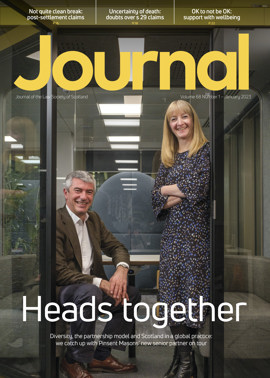The same, only better

The Law Society of Scotland should retain its regulatory functions, subject to increased transparency and accountability for its Regulatory Committee, the Scottish Government has concluded.
Just before Christmas, ministers published their long-awaited response to the results of their consultation on legal services regulation reform. In essence, the Government has declined to follow the core recommendation of the 2018 report by Esther Roberton, that there should be a new single regulator for all providers of legal services in Scotland, while accepting the need for more openness on the part of the professional bodies.
In addition, there will be a new set of regulatory objectives and professional principles, applying to all branches of the legal profession; retention of a single gateway complaints handler, with additional oversight powers; removal of significant restrictions on the operation of alternative business structures; and some legal sanction surrounding the use of the term “lawyer”.
Regulatory framework
“Building on the existing framework”, the response sets out a two tier system for regulators, allowing for a “proportionate and risk based approach” but also adaptability for changes in the market. Regulators such as the Society, “with a significant membership or whose members provide largely consumer-facing services”, would be first tier regulators, operating largely as the Society already does through a Regulatory Committee comprising legal and non-legal members with a non-legal chair. Operating independently of the regulator’s governing body, this committee would set its own governance structure, priorities and strategy, with a requirement to consult on its work.
There would be new duties to publish and lay a report before the Scottish Parliament each year, again in consultation with specified persons; and the committee would be brought within the freedom of information legislation, as is already the case with bodies including the General Teaching Council for Scotland and the General Medical Council.
Second tier regulators – those whose membership is comparatively small and less consumer facing or more specialist in terms of legal work undertaken – would not require such a committee but would have to publish their regulatory regime and an annual report, keep a publicly available register of members and ensure professional indemnity insurance cover. This presumably covers the likes of the Association of Commercial Attorneys, whose members can conduct construction litigation. Which category the Faculty of Advocates would come into is not entirely clear.
The Lord President and Court of Session should maintain responsibility for prescribing the criteria and procedure for admission to the legal professions, and for the approval of changes to practice rules, and should retain an overarching regulatory role in order to protect the independence of the legal profession.
There would also be a process for intervention by ministers in the event of failure to regulate in the public interest or to adhere to the regulatory objectives – the document references in this connection s 38 of the Legal Services (Scotland) Act 2010, which confers powers to be exercised with the agreement of the Lord President.
Objectives and principles
Supported in the consultation responses, the introduction of a modern set of regulatory objectives and professional principles is to be taken forward. Thirteen intended regulatory objectives are listed, which run through the rule of law, the interests of (and access to) justice, public and consumer interest, independent legal professions, equal opportunities and diversity, innovation and competition, accountability, quality assurance and continuous improvement, and the Better Regulation, Consumer, and Human Rights (“PANEL”) Principles.
- Eight proposed professional principles cover:
- upholding the rule of law and the proper administration of justice;
- accountability in protecting the consumer and public interest;
- acting with independence (in the interests of justice);
- acting with integrity;
- acting in clients’ best interests (and keeping client confidentiality);
- maintaining good standards of work;
- compliance with the duties normally owed by legal representatives to the court; and
- acting in conformity with professional rules and ethics.
Complaint handling
On this subject, on which the Society and the Scottish Legal Complaints Commission have largely been agreed on the need for process reform, the Government agrees that the SLCC and regulators “should have more flexibility and the ability to act in a proportionate way in considering discipline and legal complaints”. A single gateway for complaints should continue, with additional oversight of complaints handling by regulators, conferring “the ability to direct regulators on the way in which they deal with complaints about the conduct of legal professionals” – the aspect of complaints that remains within the Society’s remit at present.
The current funding model should continue, paid by a levy and in consultation with the legal profession. There is no indication of additional controls being applied to the SLCC’s budgeting process.
Alternative business structures
Greater flexibility will be introduced to the possibilities for alternative business structures, to address concerns that Scottish firms are at a competitive disadvantage compared to others. That will involve removing the restrictions in the 2010 Act that require such firms to operate for “fee, reward or gain” – allowing third sector organisations to employ legal professionals directly, to undertake reserved activities such as court proceedings – and also require a minimum of 51% ownership by legal professionals. Liberalisation, it is said, should allow for employee and community ownership as well as for greater outside ownership – there being “little evidence that non-lawyer ownership has increased professional risk” in England & Wales, in the view of the Solicitors Regulation Authority.
Other matters
The revised model should provide for entity regulation of legal businesses. Without replacing or diluting the regulation of individual legal professionals, the Government is following the view of the 80% of respondents who agreed that regulation should reflect the consumer perspective that their contract is with the legal business.
On the Society’s long campaign for legal protection around who can advertise themselves as a “lawyer”, the Government has accepted that there is a consumer expectation that someone who so describes themselves should be suitably qualified and regulated, but also that there are “notable and legitimate” reasons for others to take the title: an exclusivity rule like that for the term “solicitor” might have unintended consequences for legal academics, in-house lawyers and those who practise religious law, for example. Similarly, “advocate” may be used to describe any person who speaks on behalf of someone else. The proposed solution therefore is to make it an offence to pretend falsely to be a “lawyer” or “member of the Faculty of Advocates” in order to provide legal services to the public for a profit.
Legal tech is given a mention – regulators should have the flexibility to promote the use of “sandboxes” (essentially, test beds), and thereby innovation in provision of legal services. (Tech-adopting solicitor Brian Inkster has commented that he is “struggling to think of examples” of who this might help.)
And what work will come within this brave new scheme? The Government will “consider how a definition of legal services could be applied to Scotland in terms of reform”.
Reactions
Comment on the proposals has predictably followed the positions taken during the consultation. The Society, which backed the model chosen and strongly opposed any politically appointed regulator as a threat to the independence of the profession, described the announcement as “good news for Scottish consumers and the legal sector”.
David Gordon, the non-solicitor convener of the Society’s Regulatory Committee, commented: “We are proud of our track record in maintaining professional standards and protecting the public. This is why we are so pleased to get confirmation from ministers that the Law Society will continue as the regulator of Scottish solicitors and do so independently from the state. This is a big and important vote of confidence in the work we do.”
He added: “We know there is more to be done to improve both transparency and the public accountability of the Regulatory Committee’s public interest work. We are already looking at what can be changed in advance of the new legislation, and look forward to working with Government in thinking through wider changes which can maintain and grow public confidence.”
The SLCC, which aligned itself with the Competition & Markets Authority in supporting the Roberton single regulator plan, put on a brave face by welcoming the proposed reforms of complaints handling, while conceding it “had hoped to see more fundamental reform to better reflect the legal services sector of today and of the future”.
Chief executive Neil Stevenson continued: “We also saw opportunities to drive efficiency by reducing existing duplication of processes, functions and back office systems across multiple bodies which have not been delivered.
“However, we do believe these proposals could help to create a more efficient and proportionate complaints system, one that resolves complaints swiftly and draws learning from them to drive improvement. Proposals to improve transparency and accountability across the regulatory system are also very welcome.”
The proposed reforms have still to take legislative shape. The Government concludes by saying it has “committed to developing a bill on the regulation of legal services and will continue to engage with stakeholders representing
the consumer and legal perspective taking that forward”.
It will be some time yet before anything reaches the statute book, but all the bodies involved in regulating the Scottish profession can now plan ahead with a greater degree of confidence.
Read the Government’s response on its publications web page (22 December 2022).
See also Viewpoints in this issue.
Regulars
Perspectives
Features
Briefings
- Civil court: Costs – the tail that wags the dog
- Licensing: Keeping alcohol out of sight
- Planning: A framework for sustainability?
- Insolvency: When is a creditor not a creditor?
- Tax: A new, improved autumn statement?
- Immigration: First stop Rwanda?
- Scottish Solicitors' Discipline Tribunal: January 2023
- Civil court: Expenses – barred by delay?
- Property: Transparency, human rights and the registers






